Sole Ulcer Severity 1
The corium is exposed.
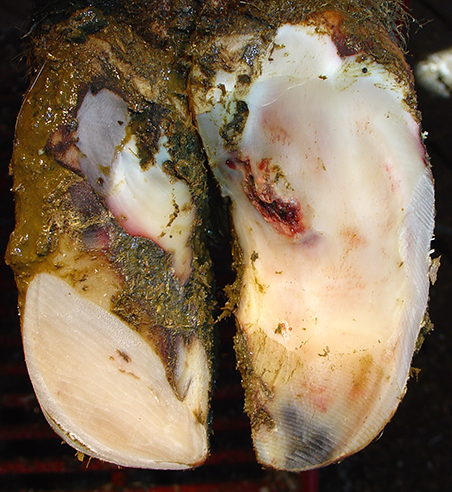
This lesion severity scoring guide is intended for the use of hoof trimmers, in particular those who are using the Hoof Supervisor® lesion recording system. The guide will assist trimmers to more consistently score the severity of the lesions they observe, making it possible to assess changes in severity from one trim session to the next.
Dr. Paul Greenough prepared the initial version of the guide which was later revised with input from hoof trimmers participating in The Alberta Dairy Hoof Health Project, namely:
Photographs were provided by:
To make suggestions for improvement of this guide or to contribute photographs, contact:
Steve Mason, 2508 Charlebois Drive NW, Calgary AB Canada T2L 0T6
phone: (403)284-5484, e-mail: steve@agromedia.ca, website: http://dairyhoofhealth.info
Sole ulcer is defined as a hole in the sole horn at the typical site (the posterior end of zone 4).
Also called: Pododermatitis Circumscripta, Rusterholz Disease
Zone Affected: 4
Severities are scored after trimming.
The corium is exposed.

Exposed granulation tissue is evident.

Exposed granulation tissue is larger than the end of a pinky finger.
Also called: Toe Necrosis, Apicalis Necrotica
Zone Affected: 1
Severities are scored after trimming.
A hole in the sole horn in the toe region (zone 1 and/or 5), difficult to differentiate from, and similar to, a White Line Lesion in zone 1.
Granulation tissue present, short toe.


Exposed necrotic tissue or bone, distinct smell, very short toe. Extreme cases may progress to involve other, more complicated lesions such as a vertical crack extending up to the coronary band.

Also called: White Line Separation, White Line Disease
Zones Affected: 1, 2, 3
Severities are scored after trimming.
Ranges from hemorrhage to slight separation of white line. Trimming may release small amounts of pus.

Minor exposure of corium; detachment of horn, commonly at heel sole/wall junction but possibly in other areas; substantial pus.
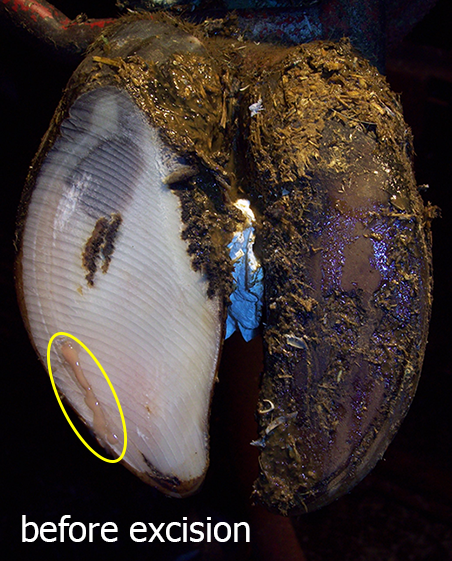

More pronounced exposure of corium, possibly extending up to the coronary band.
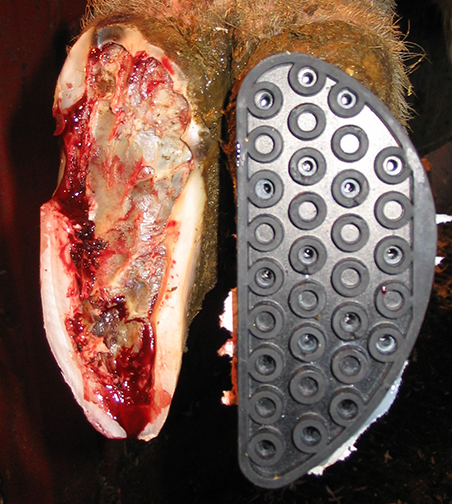
Also called: Sole Bruising
Zones Affected: 4, 5, 6
Severity score is based on appearance after trimming.
Light coloured blood streaks in sole horn.

Darker red or blue areas left in the sole after it has been trimmed.

Very dark red, purple or blue areas left in the sole after trimming.


Score all cases as severity 1.
The sole gradually grows to face inwards and upwards as the axial side of the claw rotates.

Also called: Sandcrack, Fissura Ungulae Longitudinalis
Zones Affected: 7, 8 Common signs:Score all as severity 1, irrespective of the size of the crack.
Also called: Axial Wall Fissure
Zones Affected: 11, 12
Severity is determined by the length and depth of the fissure.
A visible track appears indicating the start of a fissure but not the full distance from the interdigital space to the sole.

An enlarged crack extending from the interdigital space to the sole.

The corium is exposed in the fissure.
Also called: Hardship Groove, Horizontal Wall Fissure, Fissura Ungulae Transversalis
Zones Affected: 7, 8
A slight groove in the wall parallel to the coronary band.
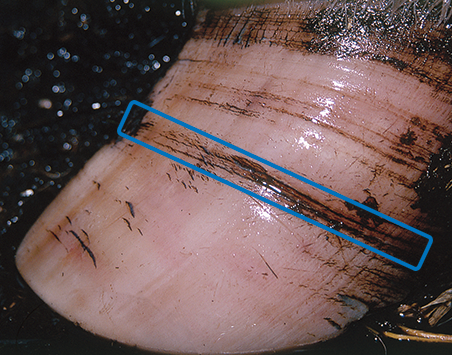

A deeper groove but loose horn is not yet evident.


Lower portion of horn is partially detached from underlying tissue, resembling a ‘thimble’.
Zones Affected: 4, 5
Common signs:Sole is ‘spongy’ when finger or ‘hoof tester’ pressure is applied.
Sole is ‘spongy’ and toe of adult animals is less than 3 inches in length from coronary band to tip.
Sole is worn through, corium is exposed and may be bleeding.
Also called: Corn, Interdigital Fibroma, Interdigital Growth
Zone Affected: 0
Growth of tissue (hyperplasia) between claws but does not fill interdigital space.
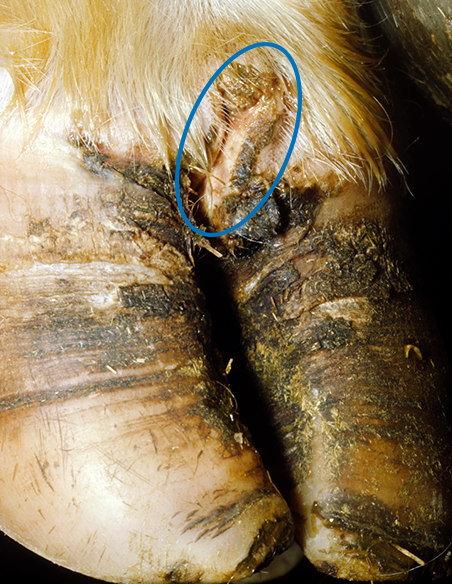
Hyperplastic tissue fills interdigital space.

Growth of tissue (hyperplasia) between claws causes claws to spread.
Also called: Foul, Phlegmon, Interdigital Phlegmon, Interdigital Necrobacillosis
Zone Affected: 9
Both digits are swollen equally up to the fetlock, including the dew claws.

Tissue between coronary band and fetlock broken open, foul odour.

Severity 2 with other complications.

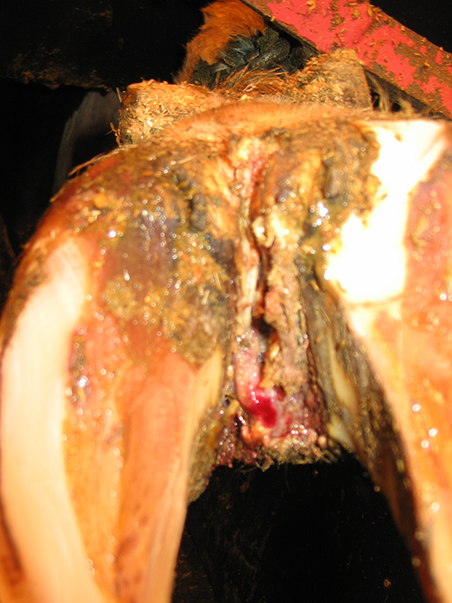
Also called: Hairy Heel Warts, Mortellaro Disease
Zones Affected: 9, 10
A circular lesion above the heel bulb smaller than a toonie (26 mm - about an inch) in diameter.
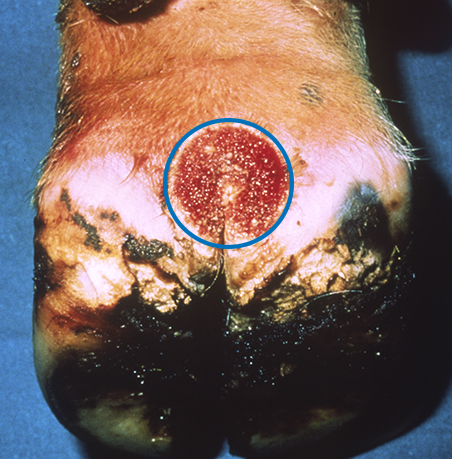
A lesion between 26 mm and 52 mm in diameter.

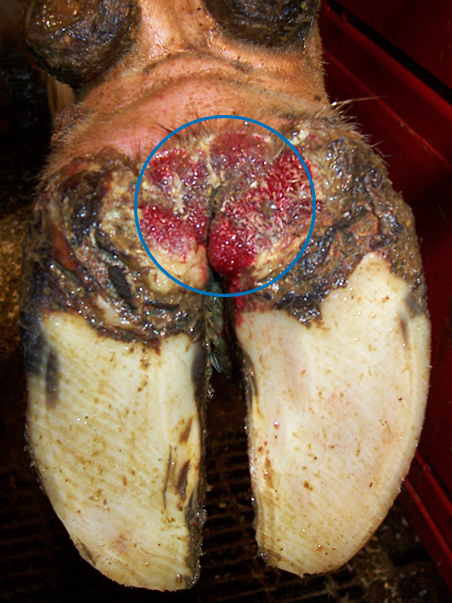
A lesion greater than 52 mm in diameter.
Zone Affected: 6
Common signs:Score all cases as severity 1.
Also called: Stable Foot Rot, Scald
Zones Affected: 0, 10
Score all cases as severity 1.
